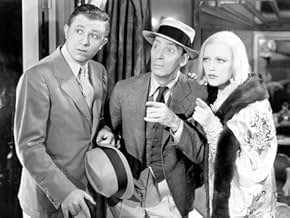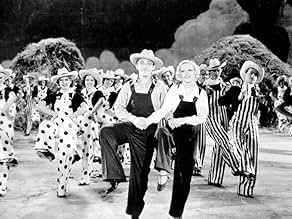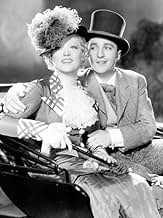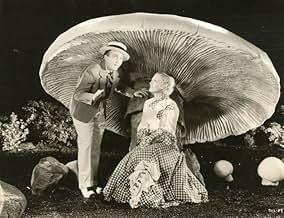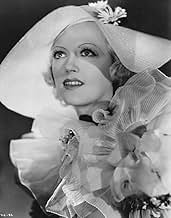Agrega una trama en tu idiomaA love-struck teacher pursues a radio singer to Hollywood.A love-struck teacher pursues a radio singer to Hollywood.A love-struck teacher pursues a radio singer to Hollywood.
- Dirección
- Guionistas
- Elenco
- Premios
- 3 premios ganados y 1 nominación en total
The Radio Rogues
- The Radio Rogues
- (as Three Radio Rogues)
Sam Appel
- Mexican Bartender
- (sin créditos)
Henry Armetta
- Henry Armetta
- (material de archivo)
- (sin créditos)
Eddie Bartell
- Member - Three Radio Rogues
- (sin créditos)
Wallace Beery
- Wallace Beery - Premiere Clip
- (material de archivo)
- (sin créditos)
Clara Blandick
- Miss Perkins - Divinity Teacher
- (sin créditos)
Harry Bowen
- Bartender
- (sin créditos)
Nora Cecil
- Briarcroft's Teacher
- (sin créditos)
Onest Conley
- Tap Dancer
- (sin créditos)
Ken Darby
- Member - The King's Men
- (sin créditos)
Jon Dodson
- Member - The King's Men
- (sin créditos)
- Dirección
- Guionistas
- Todo el elenco y el equipo
- Producción, taquilla y más en IMDbPro
Opiniones destacadas
I watched this movie because I wanted to see what Marion Davies could do in a comedy, which is supposedly what she did best. She was an attractive woman, with - at least on screen - a pleasant, unpretentious personality, so I figured she might indeed do well in comedy.
But this script, by the much admired David Ogden Stewart, gives her nothing to work with. She delivers her lines ok, but the lines are so uninteresting that I don't know what Helen Hayes could have done with them.
Davies has to dance, and she's passable but no better. But then, no worse than Crawford or some other actresses of the era who were given dance numbers. Davies has to sing, and again, she's not bad, but nothing special.
In short, this movie doesn't make a case for Davies as an actress in comedy. It doesn't make her look bad, but it doesn't make you think she was a great comedian, either.
For me, the best thing, the only really good thing, in this movie was Bing Crosby's delivery of some of his musical numbers, in particular *Temptation*, a great song that he brings off very well. The other musical numbers, like the script, are bland and forgettable.
I'm surprised that Hearst, with all his money and power, couldn't have seen to it that Davies had better material. But then, perhaps the problem was not with her but with him: maybe he couldn't tell if a movie script was good or bad and imposed bad ones on her.
But this script, by the much admired David Ogden Stewart, gives her nothing to work with. She delivers her lines ok, but the lines are so uninteresting that I don't know what Helen Hayes could have done with them.
Davies has to dance, and she's passable but no better. But then, no worse than Crawford or some other actresses of the era who were given dance numbers. Davies has to sing, and again, she's not bad, but nothing special.
In short, this movie doesn't make a case for Davies as an actress in comedy. It doesn't make her look bad, but it doesn't make you think she was a great comedian, either.
For me, the best thing, the only really good thing, in this movie was Bing Crosby's delivery of some of his musical numbers, in particular *Temptation*, a great song that he brings off very well. The other musical numbers, like the script, are bland and forgettable.
I'm surprised that Hearst, with all his money and power, couldn't have seen to it that Davies had better material. But then, perhaps the problem was not with her but with him: maybe he couldn't tell if a movie script was good or bad and imposed bad ones on her.
One of the other reviewers said that this film was essentially about stalking. I had never thought of it in those terms, but it's true.
Marion Davies is a love starved French teacher at a girl's boarding school who's spare hours are taken up with the radio crooning of Bing Crosby. She follows the object of her affection out to Hollywood and in Hollywood cliché style gets her big break in the movies.
First if you're willing to accept the beautiful Marion Davies with this crowd of old spinsters at the boarding school then the rest of the plot simply follows. Second for Bing Crosby fans one has to remember that this is NOT a Crosby picture. He's the leading man in a Marion Davies film. Everyone is familiar with William Randolph Hearst and the Svengali like influence he had on her career. Marion's making a musical so you go out and buy the hottest singer currently as her leading man. And that, boys and girls, is the story of Bing's first film away from Paramount.
You also hire a topflight director in Raoul Walsh to keep things at a brisk pace. And you give Marion a good supporting cast that includes Fifi D'Orsay, Ned Sparks, Stu Erwin, and Patsy Kelly. Mix 'em together and you got Going Hollywood.
It's not a bad mix. Crosby had a lot of songs in this film. The big hit was Temptation, but there were other good ones from Nacio Herb Brown and Arthur Freed. One thing however, since this was not Paramount and MGM was known for the great production numbers in their films, Bing got some great numbers. I'm surprised frankly that Hearst allowed Crosby a huge number like the title tune, set in Grand Central Station, without Davies in it. Davies does join him in a dream sequence where she sings a couple of lines of We'll Make Hay While The Sun Shines with Marion and Bing dressed as a pair of Grand Wood rustics. Another big production number that Paramount would never spend the money for.
Davies had good if limited talents. Hearst however could only see her as a pure heroine. Since he discovered her in the Ziegfeld Follies, Davies's dancing should be no surprise. It's at least as good as Ruby Keeler's. She had a good gift for mimicry, her imitation of Fifi D'Orsay is a key point in the plot. One thing that would be considered in god-awful taste now is her donning black-face to get on Bing's movie set and imitating the dialect.
It's funny though. Think about pictures like Play Misty For Me and The Fan made two generations later. Stalking was looked on entirely differently back in those more innocent days.
Marion Davies is a love starved French teacher at a girl's boarding school who's spare hours are taken up with the radio crooning of Bing Crosby. She follows the object of her affection out to Hollywood and in Hollywood cliché style gets her big break in the movies.
First if you're willing to accept the beautiful Marion Davies with this crowd of old spinsters at the boarding school then the rest of the plot simply follows. Second for Bing Crosby fans one has to remember that this is NOT a Crosby picture. He's the leading man in a Marion Davies film. Everyone is familiar with William Randolph Hearst and the Svengali like influence he had on her career. Marion's making a musical so you go out and buy the hottest singer currently as her leading man. And that, boys and girls, is the story of Bing's first film away from Paramount.
You also hire a topflight director in Raoul Walsh to keep things at a brisk pace. And you give Marion a good supporting cast that includes Fifi D'Orsay, Ned Sparks, Stu Erwin, and Patsy Kelly. Mix 'em together and you got Going Hollywood.
It's not a bad mix. Crosby had a lot of songs in this film. The big hit was Temptation, but there were other good ones from Nacio Herb Brown and Arthur Freed. One thing however, since this was not Paramount and MGM was known for the great production numbers in their films, Bing got some great numbers. I'm surprised frankly that Hearst allowed Crosby a huge number like the title tune, set in Grand Central Station, without Davies in it. Davies does join him in a dream sequence where she sings a couple of lines of We'll Make Hay While The Sun Shines with Marion and Bing dressed as a pair of Grand Wood rustics. Another big production number that Paramount would never spend the money for.
Davies had good if limited talents. Hearst however could only see her as a pure heroine. Since he discovered her in the Ziegfeld Follies, Davies's dancing should be no surprise. It's at least as good as Ruby Keeler's. She had a good gift for mimicry, her imitation of Fifi D'Orsay is a key point in the plot. One thing that would be considered in god-awful taste now is her donning black-face to get on Bing's movie set and imitating the dialect.
It's funny though. Think about pictures like Play Misty For Me and The Fan made two generations later. Stalking was looked on entirely differently back in those more innocent days.
If you like to see the original crooner of all times and really the King of male singers. Bing was a great actor in this film along with super star Marion Davies, who was like the Marilyn Monroe during her days and even Jean Harlow. Marion Davies was also a long time friend of William Randolph Hearst, the newspaper magnet of California. Bing Crosby sings,"You were Temptation" and he must have charmed all the ladies hearts of those days. Wallace Berry, veteran actor has a brief role in this film and is uncredited along with the great Mae Clarke. This is really what Hollywood films were like in the Golden era of movies. It is a must view film.
Bing Crosby truly was the quintessential vocalist of his time. I strongly recommend Gary Giddins bio on Bing; an excellent reference.
Anyway, the story may be weak in this film, but the songs and Bing's clear baritone voice make up for it.
An interesting tidbit about this film: Of course Marion Davies was W.R. Hearst's mistress, and Hearst financed the film. Ms. Davies thus took full advantage of the situation by showing up for filming at 10 AM, shooting a scene or two before a four hour lunch replete with all the catered trimmings and wines. The day wound down by 4PM.
It's no wonder it took six months to shoot this film in an era when the typical film was shot in 2 weeks!
Anyway, the story may be weak in this film, but the songs and Bing's clear baritone voice make up for it.
An interesting tidbit about this film: Of course Marion Davies was W.R. Hearst's mistress, and Hearst financed the film. Ms. Davies thus took full advantage of the situation by showing up for filming at 10 AM, shooting a scene or two before a four hour lunch replete with all the catered trimmings and wines. The day wound down by 4PM.
It's no wonder it took six months to shoot this film in an era when the typical film was shot in 2 weeks!
Sylvia Bruce (Marion Davies) is a bored French teacher but after hearing the melodious sounds of the famous Bill Williams (Bing Crosby) on the radio, she is so inspired she leaves her job and seeks her dream.
Going Hollywood is a rather odd movie as there is the disturbing fact that Marion Davies' character is practically a stalker who insists that their love is meant to be. I can usually accept the fact that it's just a movie - it doesn't have to be realistic, but I just felt her character was a bit of a nut case. I hate to say it but Davies is most unconvincing and it is almost painful to see her scenes. I was disappointed to see this because she was magnificent in silents. That being said, Marion is undoubtedly gorgeous and has a few good moments (and she's not a bad dancer too)... but not nearly enough as there should be.
It is evident that Bing Crosby and the music are the real stars of this picture. He steals every scene from Davies with effortless delivery. The music - especially "Temptation", "Going Hollywood" and "Beautiful Girl" are absolutely delightful little tunes and make the movie well worth watching.
Overall, a bizarre and often tedious movie and Davies isn't at her best. However handsome crooner Bing Crosby and the fantastic music by Arthur Freed and Herb Brown steal the show and make it watchable. Does not compare to the other musicals of this period.
Going Hollywood is a rather odd movie as there is the disturbing fact that Marion Davies' character is practically a stalker who insists that their love is meant to be. I can usually accept the fact that it's just a movie - it doesn't have to be realistic, but I just felt her character was a bit of a nut case. I hate to say it but Davies is most unconvincing and it is almost painful to see her scenes. I was disappointed to see this because she was magnificent in silents. That being said, Marion is undoubtedly gorgeous and has a few good moments (and she's not a bad dancer too)... but not nearly enough as there should be.
It is evident that Bing Crosby and the music are the real stars of this picture. He steals every scene from Davies with effortless delivery. The music - especially "Temptation", "Going Hollywood" and "Beautiful Girl" are absolutely delightful little tunes and make the movie well worth watching.
Overall, a bizarre and often tedious movie and Davies isn't at her best. However handsome crooner Bing Crosby and the fantastic music by Arthur Freed and Herb Brown steal the show and make it watchable. Does not compare to the other musicals of this period.
¿Sabías que…?
- TriviaWhen Marion Davies requested Bing Crosby as her leading man for this film, he was under contract to Paramount, where they had him starring in shorts and a series of college themed films with Jack Oakie. The success of this film moved Crosby into starring roles at Paramount with the likes of Carole Lombard and Miriam Hopkins, a definite step upwards.
- Citas
Bill 'Billy' Williams: [singing] Out where they say, "Let us be gay," I'm going Hollywood. I'll ballyhoo greetings to you, I'm going Hollywood. Hey, while you sleepyheads are in that hay, I'll be dancing - I'm gonna be dancing with a sun-kissed baby. And I'm on my way - here's my beret, I'm going Hollywood!
- ConexionesEdited into The Big Idea (1934)
- Bandas sonorasGoing Hollywood
(1933) (uncredited)
Music by Nacio Herb Brown
Lyrics by Arthur Freed
Played during the opening credits
Sung by Bing Crosby at the railroad station
Played as background music twice
Selecciones populares
Inicia sesión para calificar y agrega a la lista de videos para obtener recomendaciones personalizadas
Detalles
- Fecha de lanzamiento
- País de origen
- Sitio oficial
- Idiomas
- También se conoce como
- Paid to Laugh
- Locaciones de filmación
- Productoras
- Ver más créditos de la compañía en IMDbPro
Taquilla
- Presupuesto
- USD 914,000 (estimado)
- Tiempo de ejecución1 hora 18 minutos
- Color
- Relación de aspecto
- 1.37 : 1
Contribuir a esta página
Sugiere una edición o agrega el contenido que falta

Principales brechas de datos
By what name was Going Hollywood (1933) officially released in India in English?
Responda
